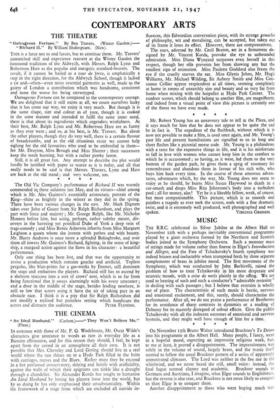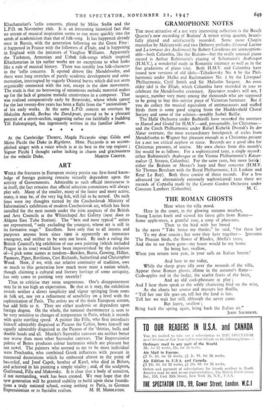MUSIC
THE B.B.C. celebrated its Silver Jubilee at the Albert Hall on November 12th with a perhaps inevitably conventional programme played by a giant orchestra formed by the Northern and Scottish bodies joined to the Symphony Orchestra. Such a monster mass of strings made for volume rather than finesse in Elgar's Introduction and Allegro, and the Fate of Tchaikovsky's fourth symphony was indeed brazen and ineluctable when trumpeted forth by three separate complements of brass in jubilee mood. The first movement of the Symphony, which was conducted by John Barbirolli, raised the problem of how to treat Tchaikovsky in his more desperate and neurotic moods, with a crise de nerfs plainly in the offing. We are used to hearing of such and such a conductor's "admirable restraint" in dealing with such passages ; but I believe that restraint is wholly out of place. The characteristic of such music is hectic, nervous and emotional excitement, and this, surely, should characterise the performance. After all, we do not praise a performance of Beethoven for its avoidance of sharp contrasts in dynamics or a reading of Debussy for its masterly disregard of colour effects. Give the public Tchaikovsky with all the indecent extremes of emotional and nervous hysteria, and they might well have enough of him for a time.
* * * *
On November 13th Bruno Walter introduced Bruckner's Te Deum into his programme at the Albert Hall. Many people, I fancy, went in a hopeful mood, expecting an impressive religious work, but, to me at least, it proved a disappointment. The impressiveness was solely in the volume of sound, largely brass, and the music itself seemed to follow the usual Bruckner pattern of a series of apparently unmotivated climaxes. The Lord was neither in the fire nor in the whirlwind, and we never heard the still, small voice: instead, the final fugue seemed clumsy and academic. Bruckner sounds to Germans and Austrians, I imagine, what Elgar sounds to Englishmen, but the reverse is also true, and Bruckner is not more likely to conquer us than Elgar is to conquer them. Another disappointment to those who went hoping much was Khachaturian's 'cello concerto, played by Milos Sadlo and the L.P.O. on November 16th. It is an interesting historical fact that no stream of musical inspiration seems to run more quickly into the sands of academicism than that of folk-song. It has happened already once in Russia, with the generation following on the Great Five : it happened in France with the followers of d'Indy, and is happening in England with the imitators of Vaughan Williams. Apparently the Turkmen, Armenian and Uzbek folk-songs which inspired Khachaturian in his earlier works are no exceptions to what looks like a rule of musical history. There was notably less folk-character in the 'cello concerto. It opened almost like Mendelssohn, and there were long stretches of purely academic development and orna- mentation, interrupted by vaguely Oriental bursts which did not seem organically connected with the rest, except in the slow movement. The truth is that no borrowing of extraneous melodic material makes up for the lack of genuine melodic creativeness in a composer. That was realised comparatively early by Stravinsky, whose whole career for the last twenty-five years has been a flight from the " nationalism " of his early works. At the same L.P.O. concert an overture by Malcolm Arnold, Beckus the Dandipratt, proved to be a pleasant portrait of a street-urchin, suggesting rather too faithfully a budding Till Eulenspiegel, but ingeniously written in the familiar idiom.
* * * *
At the Cambridge Theatre, Magda Piccarolo sings Gilda and Mini) Picchi the Duke in Rigoletto. Mme. Piccarolo is an accom- plished singer with a voice which is at its best in the top register ; Signor Picchi I thought rather lacking in charm and graciousness



































 Previous page
Previous page